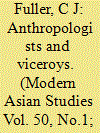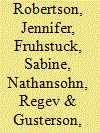|
|
|
Sort Order |
|
|
|
Items / Page
|
|
|
|
|
|
|
| Srl | Item |
| 1 |
ID:
144220


|
|
|
|
|
| Summary/Abstract |
The anthropology of caste was a pivotal part of colonial knowledge in British India in the late nineteenth and early twentieth centuries. Denzil Ibbetson and Herbert Risley, then the two leading official anthropologists, both made major contributions to the study of caste, which this article discusses. Ibbetson and Risley assumed high office in the imperial government in 1902 and played important roles in policy making during the partition of Bengal (1903–5) and the Morley-Minto legislative councils reforms (1906–9); Ibbetson was also influential in deciding Punjab land policy in the 1890s. Contemporary policy documents, which this article examines, show that the two men's anthropological knowledge had limited influence on their deliberations. Moreover, caste was irrelevant to their thinking about agrarian policy, the promotion of Muslim interests, and the urban, educated middle class, whose growing nationalism was challenging British rule. No ethnographic information was collected about this class, because the scope of anthropology was restricted to ‘traditional’ rural society. At the turn of the twentieth century, colonial anthropological knowledge, especially about caste, had little value for the imperial government confronting Indian nationalism, and was less critical in constituting the Indian colonial state than it previously had been.
|
|
|
|
|
|
|
|
|
|
|
|
|
|
|
|
| 2 |
ID:
098399


|
|
|
|
|
| Publication |
2010.
|
| Summary/Abstract |
What has distinguished anthropology from the other social sciences is an immersion in sustained fieldwork, itself premised on different kinds and levels of lived and shared experiences, usually with hitherto strangers in another culture in an often distant geographical location. In 2005 the U.S. Department of Defense inaugurated the experimental Human Terrain System, which embeds social scientists with combat brigades to enhance "operational effectiveness" and, supposedly, to reduce civilian casualties. A consensus is emerging among concerned anthropologists that ethnographic fieldwork abroad and within a broad spectrum of military activities and actors can, and must, be employed to challenge the U.S. Army's alarmingly naive concept of "weaponizing culture." The constituent essays in this thematic collection on the vicissitudes of the relationship between war and anthropology take up and complicate the premises of this challenge.
|
|
|
|
|
|
|
|
|
|
|
|
|
|
|
|
|
|
|
|
|